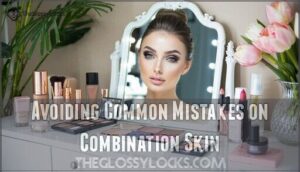This site is supported by our readers. We may earn a commission, at no cost to you, if you purchase through links.

Start with a gentle cleanser and dual primers – mattifying for your T-zone, hydrating for cheeks.
Choose satin-finish foundations that control shine while maintaining moisture.
Apply with a damp sponge on dry areas and flat brush on oily zones.
Use translucent powder only where needed and hydrating setting spray on cheeks.
The secret lies in targeted concealer application – creamy formulas for under-eyes, mattifying for blemishes.
Your skincare routine should include chemical exfoliants twice weekly and niacinamide to regulate oil production naturally.
Smart seasonal adjustments keep your look balanced year-round, ensuring your makeup works with your skin rather than against it.
Table Of Contents
- Key Takeaways
- Preparing Combination Skin for Makeup
- Choosing The Right Foundation for Combination Skin
- Makeup Application Techniques for Combination Skin
- Controlling Shine and Oiliness on Combination Skin
- Hydrating and Nourishing Dry Areas on Combination Skin
- Adjusting Makeup Routine for Seasonal Changes
- Balancing Combination Skin With Skincare Routine
- Avoiding Common Mistakes on Combination Skin
- Customizing Makeup Routine for Combination Skin
- Frequently Asked Questions (FAQs)
- Can you apply makeup on Combination Skin?
- What are the ways to get a fair skin?
- How do I choose a skin care routine for Combination Skin?
- How do you manage Combination Skin?
- How to make makeup look good on combination skin?
- What type of makeup is best for combination skin?
- How do you prepare combination skin before makeup?
- What is a good routine for combination skin?
- How can I prevent foundation oxidation on my skin?
- Are fixing sprays beneficial for combination skin makeup?
- Conclusion
Key Takeaways
- Use dual primers strategically – Apply mattifying primer to your T-zone for oil control and hydrating primer to dry areas like cheeks to create the perfect base for foundation application.
- Apply foundation with zone-specific techniques – Use a damp sponge on dry areas for hydrating coverage and a flat brush on oily zones for better control and even application.
- Set makeup selectively with powder – Only apply translucent powder to your T-zone where you need shine control, then finish with hydrating setting spray on cheeks to maintain moisture balance.
- Choose targeted concealer formulas – Use creamy concealers for under-eye areas that need hydration and mattifying formulas for blemishes in oily zones to address each area’s specific needs.
Preparing Combination Skin for Makeup
The secret to flawless makeup on combination skin starts with proper prep work that addresses both your oily T-zone and dry areas.
You’ll need to balance oil control with hydration using targeted cleansing, strategic moisturizing, and pH-balancing products that create the perfect canvas for your makeup application.
Cleansing and Exfoliating
Master your cleansing routine by choosing gentle cleansers that won’t strip your skin’s natural balance.
Use chemical exfoliation with alpha hydroxy acids twice weekly to smooth texture and prevent clogged pores. Follow with balancing toners to restore pH levels across different zones.
Choosing the right product can be challenging. Consider using a suitable gentle cleanser for ideal results.
- Morning ritual: Balancing face wash removes overnight buildup without over-drying cheeks
- Weekly reset: Chemical exfoliants dissolve dead skin cells for smoother makeup application
- Evening wind-down: Hydrating ingredients in nighttime treatments repair your skin barrier
Moisturizing and Hydrating
Now that you’ve cleansed and exfoliated, your skin needs the right hydrating ingredients to create the perfect makeup base.
Hydrating serum works like a moisture magnet for your face. Choose products with humectants vs. emollients – humectants like hyaluronic acid draw water into skin, while emollients create a protective barrier. For combination skin, you’ll want both.
Apply a lightweight moisturizer to your entire face, then target dry areas with extra product. Hydrating dry patches prevents makeup from clinging to flaky spots. Keep facial mists handy for quick hydration levels boosts throughout the day.
Don’t forget nighttime hydration – your skin repairs itself while you sleep. Internal hydration matters too, so drink plenty of water. This balanced approach guarantees your T-zone stays controlled while dry zones get the moisture they crave.
Targeting T-Zone and Dry Areas
Once you’ve hydrated your skin, it’s time to address the contrasting needs of your T-zone and dry areas with dual priming strategies.
Your oily T-zone craves mattifying control while dry patches need extra hydration. Natural ingredients often work best for combination skin, addressing both oily and dry areas effectively.
- Apply mattifying primer to your T-zone for oil control
- Use hydrating primer on cheeks and jawline for moisture retention
- Practice foundation zoning with different formulas for each area
- Master targeted concealing techniques for blemishes versus dry patches
- Perfect powder placement by focusing only on oily zones
Balancing Skin PH
Your skin’s acid mantle needs balanced pH levels between 4.2-5.6 for ideal barrier function.
Alkaline products disrupt your skin microbiome, causing chaos in both oily and dry zones.
Choose pH-balanced toners and gentle cleansers for your combination skin makeup prep.
This skincare routine creates the perfect canvas for makeup tips combination skin enthusiasts swear by, ensuring balancing skin makeup stays put all day.
Choosing The Right Foundation for Combination Skin
Finding the right foundation for combination skin means balancing coverage without emphasizing texture differences between your oily T-zone and drier cheek areas.
You’ll want to focus on formulas that provide buildable coverage while working harmoniously with both skin zones, which is crucial for achieving a natural look and harmoniously blending the different skin zones.
Selecting The Right Finish (Dewy, Matte, or Satin)
Foundation finish determines your makeup’s final look and performance throughout the day.
For combination skin makeup, satin finishes offer the perfect compromise—they control shine in your T-zone while maintaining hydration on dry cheeks. Matte finish works best for targeted finishes in oily areas, while dewy finish enhances dry zones.
Those with dry skin may prefer a dewy makeup look for a natural glow.
Consider layering finishes seasonally: lighter coverage in summer, richer formulas in winter for ideal finish longevity across your skin undertones.
Finding The Perfect Shade
Nobody wants their foundation to disappear within hours or look completely wrong.
Test shades on your jawline in natural light, checking how they blend with your neck. Undertones matter more than surface color – warm, cool, or neutral undertones should match your skin’s natural hue.
Watch for oxidation effects as foundations can darken after application. Consider seasonal adjustments since combination skin changes throughout the year, affecting how colors appear on your complexion.
An inclusive shade range guarantees accurate undertone variety, which is crucial for finding the right match, considering natural hue is key to a flawless look.
Non-Comedogenic and Oil-Free Options
Once you’ve found your perfect shade, choosing noncomedogenic and oilfree options becomes your secret weapon for combination skin makeup tips that prevent breakouts while maintaining oil control and pore care.
To find the right product, consider a foundation for sensitive skin.
- Research ingredient labels to avoid pore-clogging ingredients like comedogenic oils
- Select clean beauty formulas with lightweight, breathable textures
- Prioritize oil control technology that regulates shine without overdrying
- Test noncomedogenic makeup to confirm proper pore care and breakout prevention
The steps outlined above provide a comprehensive approach to selecting the appropriate makeup for combination skin, focusing on preventing breakouts and maintaining healthy pores.
Makeup Application Techniques for Combination Skin
Mastering makeup application for combination skin means understanding that different areas of your face need different approaches.
You’ll need to customize your technique for each zone, using hydrating products on dry areas while controlling oil in your T-zone for a flawless, balanced finish.
Priming for Different Areas (Hydrating, Mattifying)
You’ll master combination skin by using targeted formulas for each zone.
Apply mattifying primer with silicone primers to your Tzone for oil control and pore filling.
Use hydrating primer on dry cheeks with nourishing primer ingredients.
This primer layering technique creates the perfect canvas for foundation application.
Many brands offer T-zone targeted solutions.
Foundation Application (Damp Sponge, Flat Brush)
With your primer set, it’s time to apply foundation that works with combination skin’s unique needs.
Your application technique determines whether you’ll achieve buildable coverage that looks natural across different zones.
- Sponge vs. Brush: Damp sponge application creates dewy finishes perfect for dry areas, while flat brushes deliver matte coverage for oily zones
- Product Absorption: Damp sponges absorb excess foundation, preventing heavy buildup on combination skin
- Buildable Coverage: Layer foundation gradually using your chosen tool for customized coverage
- Application Technique: Blend with gentle patting motions for flawless makeup finish across all areas
Concealer Application (Creamy, Mattifying)
With foundation smoothly applied, concealer shade matching becomes your next focus.
Choose creamy undereye formulas for brightness and mattifying blemishes coverage for oily spots.
These application techniques target combination skin’s dual needs perfectly.
Use a small brush for precise placement, then blend gently.
Setting concealer with light powder guarantees your matte finish stays put while keeping the under eye area naturally luminous.
Powder Application (Light, Mattifying)
With concealer set, grab a fluffy brush and lightly dust translucent setting powder only on your T-zone.
This mattifying technique controls shine without caking dry areas.
Skip face powder on cheeks to maintain natural dewiness.
Use gentle tapping motions for even application, and keep blotting papers handy for quick touch-ups throughout the day to ensure a flawless finish with translucent setting powder.
Controlling Shine and Oiliness on Combination Skin
Managing shine in your T-zone while keeping dry areas comfortable requires a strategic approach to setting your makeup.
You’ll want to use translucent powder selectively on oily areas and finish with a hydrating setting spray to lock everything in place without over-drying your cheeks.
Setting Makeup With Powder or Setting Spray
Think of setting products as your makeup’s bodyguard—they protect your hard work from fading.
Apply translucent setting powder to your T-zone using a damp sponge for targeted oil control.
Follow with hydrating setting spray on cheeks to lock in moisture.
This dual approach guarantees your combination skin stays balanced and flawless for hours.
Maintaining a Balanced Skincare Routine
Beyond setting your makeup, maintaining your combination skin care routine keeps your complexion balanced long-term.
Gentle Cleansing with pH-balanced formulas removes excess oil without stripping moisture. Targeted Hydration addresses each zone’s specific needs through strategic product placement.
Here are 5 game-changing combination skin routine steps:
- Regular Exfoliation with BHAs twice weekly prevents clogged pores
- Balanced Products containing niacinamide regulate oil production naturally
- Nighttime Routine with hydrating serums repairs skin overnight
- Skincare prep creates the perfect makeup base daily
- Combination skin products formulated to meet dual-zone needs deliver consistent results
Hydrating and Nourishing Dry Areas on Combination Skin
While combination skin’s dry patches can leave your makeup looking patchy and flaky, targeted hydration creates the perfect smooth canvas for seamless application.
You’ll need to treat these thirsty areas with extra care, using richer formulas and gentle techniques to achieve that coveted even finish.
Using Creams, Emollients, and Serums
Creams, emollients, and serums work together to balance your combination skin care routine.
Ceramide-rich creams strengthen dry zones while lightweight emollients prevent clogged pores in oily areas. Niacinamide serums regulate T-zone oil production, and hyaluronic acid serums plump dry patches.
Layer serums first, then emollients to lock in hydration. This targeted approach creates ideal skincare prep for flawless makeup application across different facial zones.
Creams
Emollients
Serums
Combination Picks
Applying Thicker Moisturizers to Dry Areas
Your dry skin zones need more love than your oily T-zone can handle. Apply rich, creamy moisturizers specifically to parched cheeks and jawline while keeping lighter formulas on oily areas.
This Targeted Hydration approach prevents overloading your entire face with heavy products your combination skin doesn’t need everywhere.
Cream Application works best when you’re strategic about placement and timing:
- Use Occlusive Benefits from ingredients like ceramides and shea butter to lock moisture into dry patches
- Focus on Nighttime Repair by applying thicker moisturizers before bed when your skin naturally regenerates
- Practice Avoiding Overload by using a light hand and building coverage gradually in dry areas
This targeted hydration method helps your combination skin achieve balance without triggering excess oil production in your T-zone.
Exfoliating and Brightening Dry Areas
Weekly enzyme exfoliation tackles rough texture and flakiness on dry zones without harsh scrubbing.
Chemical peels with AHAs gently dissolve dead skin cells, while brightening serums with vitamin C illuminate dull patches.
Follow with hydrating masks to restore moisture balance.
Natural ingredients can be particularly effective for this skin type.
These targeted treatments smooth your canvas for makeup application.
Protecting Skin From Environmental Stressors
Your combination skin faces daily environmental attacks that can disrupt your skin barrier and worsen dryness.
Shield yourself with these protective strategies:
- UV Protection – Apply broad-spectrum SPF daily to prevent sun damage and maintain skin hydration
- Antioxidant Serums – Use vitamin C mornings for pollution defense and free radical protection
- Hydration Barriers – Layer ceramide-rich moisturizers to lock moisture in dry zones
- Night Repair – Apply restorative treatments while you sleep for maximum recovery
Adjusting Makeup Routine for Seasonal Changes
Your combination skin changes with the seasons, becoming oilier in summer and drier in winter.
You’ll need to switch up your makeup products and techniques to match these seasonal shifts and maintain a flawless finish year-round.
Summer (Oily Skin) Vs. Winter (Dry Skin)
Master seasonal adjustments to control oiliness and hydrate dry areas effectively.
Summer’s increased sebum production demands mattifying primers and oil-free foundations for your T-zone, while winter’s moisture loss requires hydrating serums and cream formulas for cheeks.
Switching seasonal products maintains ideal hydration levels and makeup longevity despite texture changes throughout the year, ensuring the use of oil-free foundations is a key part of this process.
Adjusting Product Choices and Application
Your skin changes with the seasons, so your makeup routine should too.
Product layering becomes key when formula compatibility matters most. Summer calls for lightweight, oil-controlling makeup products that won’t overwhelm your T-zone. Winter demands richer formulas with targeted solutions for dry patches.
Consider ingredient sensitivity when switching between seasonal application techniques.
- Summer Switch: Swap heavy foundations for gel-based formulas and mattifying primers
- Winter Warmth: Layer hydrating serums under cream foundations for extra moisture
- Tool Talk: Use damp sponges in humid months, dry brushes when skin feels tight
Smart application tools make all the difference. These balancing tips help you master combination skin year-round with the best products for each season.
Balancing Combination Skin With Skincare Routine
Your skincare routine is the foundation that determines whether your makeup will look flawless or patchy on combination skin.
The right cleansing and moisturizing approach creates a balanced canvas that prevents your T-zone from getting greasy while keeping dry areas smooth and hydrated.
Cleansing and Exfoliating Regularly
Regular cleansing creates the foundation for balanced combination skin.
Choose gentle cleansers that won’t strip natural oils while effectively removing impurities. Incorporate chemical exfoliation with beta hydroxy acids twice weekly to clear pores and smooth texture.
Balancing toners help maintain pH levels after cleansing. Follow with nighttime treatments to support skin repair and prevent both excess oil and dryness.
This consistent skincare routine prevents both excess oil and dryness, ensuring a balanced and healthy skin through regular cleansing.
Moisturizing and Hydrating Dry Areas
Focus on targeted hydration for your combination skin’s dry areas using thicker moisturizers with emollient ingredients like ceramides.
Hyaluronic acid serums provide deep hydration beneath your lightweight moisturizer.
Apply cream application techniques by pressing product into dry areas while avoiding the T-zone.
This serum benefits approach offers environmental protection and balanced nourishment.
Avoiding Common Mistakes on Combination Skin
Even with the best intentions, you can easily sabotage your combination skin makeup routine with a few simple missteps.
These common mistakes can leave your T-zone looking greasy while your cheeks appear patchy and uneven, which is why understanding complete concepts of skincare is crucial.
Over-Exfoliating or Over-Stripping Skin
Aggressive exfoliating throws your combination skin into chaos, creating barrier damage and imbalanced pH levels.
You’ll notice redness & irritation spreading beyond your usual T-zone troubles, plus dehydration signs appearing where you least expect them.
- Skip daily scrubs – exfoliate twice weekly maximum to prevent skin stripping
- Choose gentle formulas – harsh acids trigger product overload and skin irritation
- Watch for warning signs – tightness, flaking, or burning means you’ve gone overboard
- Rebuild your skin barrier – use ceramide-rich moisturizers to restore combination skin balance
Not Blending Makeup Properly
When you skip proper blending techniques, you’re basically sabotaging your makeup routine. Make sure you avoid harsh lines and patchy coverage by mastering seamless makeup application.
Work in light layers using expert techniques and the right tools for uneven application prevention.
| Common Issue | Wrong Tools Used | Expert Solution |
|---|---|---|
| Harsh Lines | Dense brushes only | Damp sponge blending |
| Patchy Coverage | Dirty applicators | Clean, quality tools |
| Uneven Application | Wrong product compatibility | Match formulas properly |
| Streaky finish | Rushed application | Build layers gradually |
| Cakey texture | Heavy-handed technique | Light, pressing motions |
Perfect blendable powder application requires patience and proper makeup techniques for flawless results.
Not Setting Makeup With Powder or Setting Spray
Beyond blending mistakes, setting makeup properly prevents your combination skin look from falling apart within hours.
Without powder or setting spray, your natural finish disappears, leaving oily zones shiny and dry areas patchy.
Combination skin often requires gentle cleansing techniques to maintain balance.
- Apply translucent powder only to your T-zone for oil control
- Use hydrating setting spray on cheeks to maintain dewy looks
- Choose finely milled powder to prevent cakeyness on dry patches
- Allow minimal product time to set before adding layers for skin breathing
Customizing Makeup Routine for Combination Skin
Your combination skin needs a personalized approach that addresses both oily and dry zones with targeted products and techniques.
You’ll achieve the best results by customizing your routine based on your specific skin concerns, seasonal changes, and consulting professionals when needed, which will help you address your skin’s unique combination needs.
Balance your oily T-zone and dry cheeks with targeted techniques for flawless all-day wear
Considering Skin Type, Tone, and Concerns
Your combination skin demands personalized attention.
Skin tone matching guarantees your foundation won’t clash with your natural complexion, while undertone considerations help select shades that enhance rather than fight your skin.
Texture irregularities require targeted coverage strategies, and sensitivity levels dictate product choices.
Address specific concerns like enlarged pores or flakiness with specialized formulas designed for oily and dry skin combinations.
| Skin Concern | Product Type | Application Tip |
|---|---|---|
| Oily T-zone | Mattifying primer | Apply only to center face |
| Dry cheeks | Hydrating foundation | Use damp sponge for blending |
| Uneven tone | Color-correcting concealer | Spot-treat problem areas |
| Large pores | Pore-filling primer | Press gently into skin |
Consulting With a Dermatologist or Makeup Artist
Consulting professionals transforms your makeup routine through personalized advice and expert recommendations.
Dermatologists provide skin analysis to identify underlying issues affecting makeup performance, while makeup artists offer specialized product selection techniques.
These artist experts deliver treatment options customized to your specific skin types and concerns.
Professional consultation increases satisfaction rates by 48% for combination skin users compared to trial-and-error methods, addressing your unique skin concerns effectively through a targeted approach and resulting in higher satisfaction due to expert recommendations.
Making Adjustments Based on Seasonal Changes
Your combination skin faces different seasonal challenges that demand strategic adjustments throughout the year.
Seasonal skincare shifts keep your combination skin balanced all year long
Winter calls for Winter Hydration with richer moisturizers and hydrating foundations to combat dryness. Summer demands Summer Oil-Control with lightweight, oil-free formulas to manage excess shine.
- Switch to Seasonal Primers – mattifying for summer heat, hydrating for winter cold
- Make Foundation Swaps between dewy winter formulas and oil-free summer options
- Consider Climate Considerations when choosing powder versus setting spray finishes
- Adjust your seasonspecific skincare routine with heavier creams in cold months
- Monitor hydration levels and increase dry skin treatments during harsh weather
Frequently Asked Questions (FAQs)
Can you apply makeup on Combination Skin?
You can definitely apply makeup on combination skin.
Use targeted primers—mattifying for your T-zone and hydrating for dry areas.
Choose lightweight, buildable foundations and set only oily zones with powder.
What are the ways to get a fair skin?
Beauty isn’t skin-deep, they say, but achieving fairer skin requires consistent care.
You’ll need gentle exfoliation, vitamin C serums, sunscreen daily, and products with kojic acid or arbutin to gradually lighten pigmentation and maintain even tone, which helps in achieving consistent care.
How do I choose a skin care routine for Combination Skin?
Start with a gentle cleanser to balance oil and dryness.
Use lightweight, hydrating serums followed by gel-cream moisturizers.
Apply different products strategically—mattifying treatments for your T-zone, richer hydration for cheeks, using a strategic approach.
How do you manage Combination Skin?
Masterfully manage your multifaceted complexion by cleansing gently, moisturizing strategically with lightweight products, using dual primers for different zones, and applying buildable foundation with damp sponges for seamless coverage.
How to make makeup look good on combination skin?
Use targeted primers: mattifying for your T-zone, hydrating for dry cheeks. Apply liquid foundation with a damp sponge for even coverage. Set only oily areas with translucent powder.
What type of makeup is best for combination skin?
Think of your face as a balancing act—you’ll need lightweight, buildable products that won’t tip the scales.
Choose semi-matte liquid foundations, cream concealers, and gel-based primers that hydrate dry areas while controlling T-zone shine.
How do you prepare combination skin before makeup?
Cleanse gently with a balancing gel wash to remove impurities without stripping oils.
Apply lightweight, oil-free moisturizer to hydrate dry areas without overwhelming your T-zone.
Prime strategically using mattifying formulas where needed, and remember to hydrate dry areas to achieve the best results.
What is a good routine for combination skin?
Start with balance, not battle—your routine should harmonize oily and dry zones.
Gentle gel cleanser, lightweight moisturizer, then mattifying primer on your T-zone only.
You’ll control shine while preventing flakiness everywhere else.
How can I prevent foundation oxidation on my skin?
Foundation oxidation happens when your skin’s pH, oils, and environmental factors react with makeup ingredients.
Prime properly with oil-free formulas, choose oxidation-resistant foundations, and set strategically to maintain your perfect shade all day.
Are fixing sprays beneficial for combination skin makeup?
A stitch in time saves nine – fixing sprays work wonders for combination skin.
They lock in your makeup, control oil in your T-zone, and keep dry areas hydrated throughout the day, which is why fixing sprays are so valuable.
Conclusion
Mastering combination skin makeup means embracing targeted techniques that honor your skin’s unique needs.
You’ve learned to prep with dual primers, apply foundation strategically, and set selectively.
These combination skin makeup tips transform your routine from guesswork into precision artistry.
Remember that consistency creates results, patience builds expertise, and practice develops mastery.
Your skin deserves this thoughtful approach, and with these techniques, you’ll achieve that coveted balanced, flawless finish every single day.
- https://www.today.com/shop/best-combination-skin-makeup-t255722
- https://graziadaily.co.uk/beauty-hair/makeup/best-foundation-for-combination-skin/
- https://www.beautymarkedfl.com/blog/matte-vs-dewy-makeup-finding-your-perfect-finish
- https://boombeauty.com/blogs/boom/matte-vs-dewy-what-is-best-for-your-skin
- https://www.paulaschoice.com/expert-advice/skincare-advice/combination-skin/what-to-do-when-you-have-combination-skin.html
















